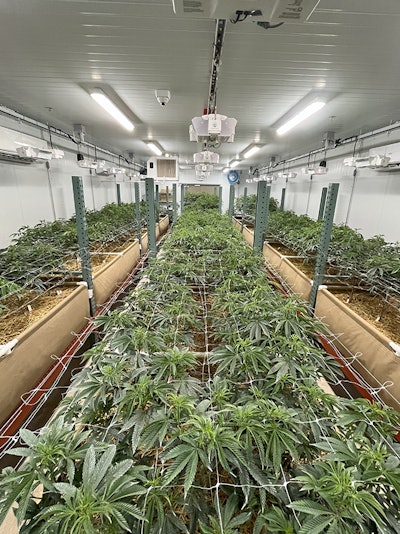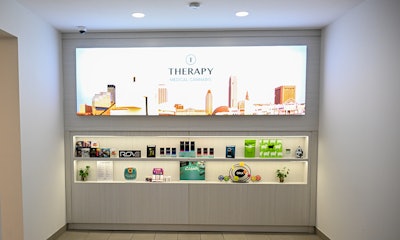New Era of Scaling a Cannabis Business Starts With Discipline, CEO Explains
July 7, 2025
The green rush days of grabbing land and stockpiling assets are no more for U.S. cannabis businesses, which were forced to adapt or die in the great correction of 2022.
Many of the largest companies in the industry are still downsizing their operations through divestitures, either by consolidating or exiting certain state markets entirely.
While some executives steered their ships to grow too big, too fast, that doesn’t mean opportunities don’t exist for up-and-comers or aspiring entrepreneurs hoping to enter the licensed cannabis space today.
For Chris Ras, who was named the CEO at Atlanta-based TheraTrue in June, being a chief cannabis executive now means driving top-line growth while managing bottom-line discipline.
“If I look at people or organizations that have maybe made mistakes in the past, it’s over-scaling certain parts of the business with the expectation to grow into it in two to five years or two to 10 years,” he said. “And I think it’s more important to really just preserve resources, preserve cash, and do scale your business … in a way that you grow into your assets quickly.”
Ras has more than 20 years of retail and cannabis experience, including six years in executive leadership roles with Columbia Care, notably as the multistate operator’s executive vice president, and, more recently, as the chief growth officer at Nevada-based Deep Roots Harvest. He also spent 10 years as an operations director at Target Corp.
A minority-owned cannabis company, TheraTrue was founded in 2019 in Georgia by scientist, entrepreneur and investor Dr. Paul Judge. The company is one of six vertically integrated license holders in Georgia’s medical cannabis market and operates two Ohio dispensaries under the Therapy Cannabis retail name in the Cleveland and Cincinnati areas.
Here, Ras shares his vision and experience as the company advances its growth strategies in current markets and expansion plans for future markets.
Editor’s note: This interview has been edited for style, length and clarity.

Chris Ras: TheraTrue offers a rare combination of growth potential and a team that wants to achieve some long-term success. I had a look at the recipe that’s needed for success there, and I’ve got a background in scaling large, complex operations, especially in cannabis, in a way that can create value. And I think the moment was right. If you look at the two markets that TheraTrue is in, Ohio just went recreational, but I would still call Ohio pretty new in the life cycle of cannabis, and Georgia, for sure, is brand new: 25,000, 26,000 active patients in that program. And so, this one feels right, not just from a historical perspective on my experience, but also right to apply lessons learned. I think the industry, the people in the industry, have definitely learned over time, and this one makes it easy.
Lange: How do you plan to leverage your past executive leadership roles in cannabis to implement TheraTrue’s growth strategy?
Ras: I have experience leading teams through retail expansions, state launches, operational restructuring, brand development, owning vertical operations, and balancing that with retail needs and customer demands. And so, I think my focus now is driving top-line growth with managing bottom-line discipline, refining how our departments collaborate, how we scale in a way that works, and quickly finding ways that aren’t effective. Cannabis demands cross-functional leadership, and I feel like that’s where I’m strongest.
Lange: How can cannabis companies balance their rapid expansion plans with operational integrity and compliance?
Ras: Without throwing out the sort of magic recipe, I think it’s just having a disciplined approach. So, what I find in the business, and if I look at people or organizations that have maybe made mistakes in the past, it’s over-scaling certain parts of the business with the expectation to grow into it in two to five years or two to 10 years. And I think it’s more important to really just preserve resources, preserve cash, and do scale your business, especially if you’re vertical, scale your verticals in a way that you grow into your assets quickly. You sweat them, and then you move back to scaling. Once you achieve success there, then it’s time to grow again. So, metaphorically, you just got married; do you need to buy an 18-bedroom house? I don’t think so. Probably get an apartment first. It sounds silly when people in their lives don’t do that, but if you’re looking at a history of cannabis operations, that happens a lot.
Lange: What do you think operators learned through that COVID-related boom in 2020 and 2021, where perhaps they over-scaled on their strategic growth plans and then the bottom dropped out? Was there a takeaway?
Ras: Absolutely, and I think the problem was really even pre-COVID, where there was the green rush. COVID only exacerbated that false sort of demand curve and that land grab-type strategy, where it was like, “How do we grab the most sites, the most licenses, the biggest cultivation?” And so, it was sort of like this frenzy mentality that I think the industry reflected in the industry. Again, I think COVID only made that even worse: the number of people working from home, the number of people out of jobs, the number of people receiving supplemental income through stimulus checks, and, of course, consumption. Consumption reached all-time record highs.
Lange: What stands out about Ohio’s cannabis market compared to other newly expanded marketplaces that you entered during your time at Columbia Care?
Ras: Ohio is one of the few markets where both demand and pricing are really strong out of the gate. Consumer interest is high. The pace of the adult-use rollout has been really healthy. Compared to other states, I think it’s enough to build a lasting brand presence but mature enough to avoid some of the chaos you see elsewhere. So, it’s not going from 50 licenses to 650; it’s still fairly disciplined, and I think that there’s strong consumer interest. There’s also a pretty healthy level of tourism in Ohio from bordering states that helps supplement the demand.
Lange: What are your short-term and long-term visions for scaling TheraTrue’s operations in Ohio?
Ras: Acquisition is exciting. If you look at the people or companies that were interested in getting into the business, I’m confident that there’s a number that got in that were interested in development and for sale. So, I would imagine that there are a number of assets, and we have a lot of experts in the state who are continuously looking for opportunities. We’re in discussion with several businesses at this time about opportunities for acquisition.
Lange: Ohio lawmakers are wrestling with legislation to upend the state’s voter-approved cannabis law. Have you gone through this in other states when you were at Columbia Care or Deep Roots Harvest, where the lawmakers changed the rules?
Ras: Not to the degree that’s been discussed in Ohio. As far as I recall, I haven’t seen an initiative to unwind what was already voted in and implemented. So, this one seems new. I’m optimistic that the voters’ voices will be preserved, and I think that cannabis is a real, viable solution for people’s needs across a variety of applications. Ohio has been really responsible about how it is protecting underage consumption and making sure that operators are compliant. And so, I am optimistic that Ohio will still continue to be successful.
Lange: It’s basically like anything else in cannabis, where you just have to adapt with the hand you’re dealt, right?
Ras: Sure, sure. And that said, all that goes back to experience and history of just having to operate across several states. There are some similarities, but it really is like operating unique businesses. Learning to be highly flexible and nimble pays dividends.

Ras: Well, I think Georgia to me is really exciting. Georgia’s uniquely structured, it’s tightly regulated, and in my opinion, that plays to our strengths. We’re also the hometown company in Georgia. I think Georgia drives a lot of American culture, from sports to entertainment, music, and the medical profession—there are several research centers based in Atlanta. There’s a lot of plethora of national companies that are based in Georgia. I think the investment community is strong. Georgia’s population continues to grow. So, when we think about the soup, so to speak, the ingredients of this soup, I think they come together in a way that really can make a powerful recipe. Our company was founded in Georgia. We’re minority-owned. We’re deeply connected to the culture and the consumer. And so, I think we’re strongly positioned in Georgia better than anybody possibly could be. And, as you know, I think local cannabis operators really know how to win the hearts and minds of the customer. They know how to resonate; I think they’re positioning is stronger, their connection to the customer and the community is stronger, and the outreach is stronger.
And so, for Georgia, for us, I think it is an exciting market. Yes, it’s restrictive, but we are highly disciplined in our compliance, and I think that as the voter population in Georgia starts to see cannabis as a unique solution, as a better alternative to some medical conditions, the medical program will grow. Again, we’re one of six license holders, and so the opportunity is tremendous.
Lange: What’s the best approach to build consumer trust and expand medical cannabis patient registries in states like Georgia?
Ras: There are six license holders, and as each license holder develops its dispensary footprint, I can tell you this: TheraTrue is going to do its part by having an exceptionally well-trained staff who really is able to assist the patient journey. That is a real grassroots way of building trust, sort of one patient at a time, when somebody has an exceptional experience. Everybody has their cannabis story, maybe misused or overused or used the wrong product for the wrong situation. And so, someone at a dispensary who has great training, has great listening skills, a tremendous amount of empathy to listen to somebody to understand their needs, and to slowly walk them through that healing journey is what’s necessary. Will it take some time? I think so, but just like anything else, great experiences start slow in numbers, but eventually the word starts to get out rapidly. People who are suffering from a qualifying condition and are now using cannabis as an alternative are going to start to see some real benefits.
Lange: There’s definitely not a one-size-fits-all solution to medical cannabis patients where there’s one go-to product for everyone, so I understand your point.
Ras: When I got to the industry, I was fortunate to jump into a dispensary that was already established, and I officed actually out of a dispensary, and when I say office, it was like a chair and a desk in the corner of a room. And so, watching patients, I was blown away by watching the difference of a sales agent—a budtender—of how there are some individuals that either through training or company training or on their own found a way to understand cannabis and understand how they could educate themselves in a way that makes a difference. They literally had customers calling the store to say, “Hey, is so-and-so there? I want to ask them a question.” Having that level of compassion and having that level of care, that’s what builds a community of trust. And I know we plan on investing heavily in our education.
Lange: What other state markets look attractive to TheraTrue for potential expansion opportunities?
Ras: We’re looking and taking a discipline approach, right? We’re in Georgia; we’re in Ohio. Those are existing operations today. And so, that’s always a focus. We do have activity and interest in Alabama, Virginia, and possibly Texas, with Texas coming online.
Search
RECENT PRESS RELEASES
Related Post



